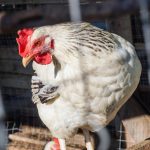Pigeons and chickens have been kept together for centuries, as both are domesticated birds raised for various purposes such as meat, eggs, and companionship. Despite their differences, these two species can coexist harmoniously under proper conditions and care. This article examines the compatibility of pigeons and chickens, focusing on housing requirements, feeding practices, health considerations, and flock dynamics.
Understanding the specific needs of both species and their interactions is crucial for maintaining a thriving and diverse flock. By addressing these factors, poultry keepers can successfully integrate pigeons and chickens on their homesteads, creating a unique and balanced avian community.
Table of Contents
- 1 Understanding the Compatibility of Pigeons and Chickens
- 2 Housing and Coop Considerations for Pigeons and Chickens
- 3 Feeding and Nutrition for Pigeons and Chickens
- 4 Health Considerations for Keeping Pigeons and Chickens Together
- 5 Managing Flock Dynamics and Behavior
- 6 Tips for Successfully Keeping Pigeons with Chickens
- 7 FAQs
- 7.1 Can you keep pigeons with chickens?
- 7.2 Do pigeons and chickens get along?
- 7.3 What are the benefits of keeping pigeons with chickens?
- 7.4 Are there any drawbacks to keeping pigeons with chickens?
- 7.5 How should the coop or aviary be set up for pigeons and chickens?
- 7.6 What should be considered when introducing pigeons to a chicken flock?
Key Takeaways
- Keeping pigeons with chickens can be a rewarding and mutually beneficial experience for both birds.
- Pigeons and chickens are generally compatible and can coexist peacefully with proper management and care.
- Providing separate housing and coop spaces for pigeons and chickens is essential for their well-being and safety.
- A balanced diet with appropriate nutrition is crucial for the health and productivity of both pigeons and chickens.
- Regular monitoring and preventive measures are important for maintaining the health and harmony of a mixed flock of pigeons and chickens.
Understanding the Compatibility of Pigeons and Chickens
Benefits of Pigeons in the Flock
Pigeons are known for their gentle nature and peaceful demeanor, making them well-suited to cohabitate with chickens. They are also excellent flyers and can provide a beautiful and calming presence in the flock.
Advantages of Chickens in the Flock
Chickens, on the other hand, are social birds that thrive in a group setting. They are also excellent foragers and can help keep the area clean by eating insects and other pests.
Coexistence and Considerations
When kept together, pigeons and chickens can benefit from each other’s company and contribute to a diverse and dynamic flock. However, it’s important to note that some individual birds may not get along, so it’s essential to monitor their interactions and provide enough space for each species to thrive.
Housing and Coop Considerations for Pigeons and Chickens

When keeping pigeons with chickens, it’s crucial to provide adequate housing and coop considerations for both species. Pigeons require a secure and spacious loft or coop where they can roost, nest, and fly freely. The loft should have good ventilation and protection from predators, as well as perches and nesting boxes for the pigeons to feel comfortable and safe.
Chickens, on the other hand, need a coop with nesting boxes, roosts, and access to an outdoor run for foraging. The coop should also be predator-proof and provide enough space for the chickens to move around and exhibit natural behaviors. When housing pigeons and chickens together, it’s important to provide separate areas for each species to roost and nest, as well as access to food and water without competition.
By providing adequate housing and coop considerations for both pigeons and chickens, you can ensure their safety, comfort, and well-being in a shared living space.
Feeding and Nutrition for Pigeons and Chickens
Feeding and nutrition are essential aspects of keeping pigeons with chickens. Pigeons are granivorous birds that primarily eat seeds, grains, and legumes. They also require access to grit and minerals for proper digestion.
Chickens, on the other hand, are omnivorous birds that eat a varied diet of grains, seeds, fruits, vegetables, insects, and small animals. When feeding pigeons and chickens together, it’s important to provide a balanced diet that meets the nutritional needs of both species. This can include a commercial poultry feed for the chickens, supplemented with grains, fruits, vegetables, and occasional protein sources.
For the pigeons, a pigeon mix or pigeon feed can be provided, along with access to grit and minerals. It’s also important to ensure that both species have access to clean water at all times. By providing a balanced diet and proper nutrition for both pigeons and chickens, you can support their overall health and well-being in a shared environment.
Health Considerations for Keeping Pigeons and Chickens Together
When keeping pigeons with chickens, it’s important to be mindful of the health considerations involved in caring for both species. Pigeons are generally hardy birds but can be susceptible to respiratory infections, parasites, and nutritional deficiencies if not properly cared for. Chickens are also prone to various health issues such as respiratory diseases, parasites, and egg-related problems.
When kept together, it’s essential to monitor the health of both pigeons and chickens regularly and provide appropriate veterinary care when needed. It’s also important to practice good biosecurity measures to prevent the spread of diseases between the two species. This can include keeping the coop clean and dry, providing proper ventilation, quarantining new birds before introducing them to the flock, and practicing good hygiene when handling the birds.
By being proactive about health considerations and providing proper care for both pigeons and chickens, you can help prevent illness and maintain a healthy flock.
Managing Flock Dynamics and Behavior

Chickens also have a pecking order within their flock, with dominant birds establishing their rank through displays of aggression or submission. When kept together, it’s essential to monitor the interactions between pigeons and chickens to ensure that no bird is being bullied or excluded from resources such as food or water.
Minimizing Competition and Stress
Providing enough space, perches, nesting boxes, and feeding areas can help minimize competition and reduce stress within the flock. It’s also important to observe the behavior of individual birds and intervene if any aggressive or harmful behavior is observed.
Creating a Harmonious Environment
By managing flock dynamics and behavior effectively, you can create a harmonious living environment for both pigeons and chickens.
Tips for Successfully Keeping Pigeons with Chickens
In conclusion, keeping pigeons with chickens can be a rewarding experience when done thoughtfully and responsibly. By understanding the compatibility of pigeons and chickens, providing adequate housing and coop considerations, offering a balanced diet and proper nutrition, being mindful of health considerations, and managing flock dynamics and behavior, you can successfully keep these two bird species together on your homestead. It’s important to remember that each bird is an individual with its own unique needs and behaviors, so it’s essential to observe their interactions closely and make adjustments as needed.
With proper care and attention, you can create a thriving and diverse flock that brings joy and benefits to your homestead for years to come.
If you are considering keeping pigeons with chickens, it’s important to understand the dynamics of having multiple bird species in the same coop. According to a recent article on Poultry Wizard, “What is the Incubation Period for Goose Eggs?” discusses the process of hatching and raising geese, which can be helpful in understanding the complexities of managing different types of poultry in the same environment. It’s important to consider the space, feeding habits, and potential conflicts that may arise when keeping pigeons and chickens together. (source)
FAQs
Can you keep pigeons with chickens?
Yes, it is possible to keep pigeons with chickens in the same coop or aviary.
Do pigeons and chickens get along?
In general, pigeons and chickens can coexist peacefully. However, it’s important to monitor their interactions to ensure there is no aggression or bullying between the two species.
What are the benefits of keeping pigeons with chickens?
Keeping pigeons with chickens can provide companionship for both species and can also help with pest control, as pigeons are known to eat insects and pests that may bother chickens.
Are there any drawbacks to keeping pigeons with chickens?
One potential drawback is that pigeons and chickens may compete for food, so it’s important to provide enough feed for both species. Additionally, pigeons can carry diseases that may be transmitted to chickens, so regular health checks are important.
How should the coop or aviary be set up for pigeons and chickens?
The coop or aviary should be spacious enough to accommodate both species comfortably. Separate nesting areas should be provided for pigeons and chickens, and perches should be at different heights to prevent any potential conflicts.
What should be considered when introducing pigeons to a chicken flock?
When introducing pigeons to a chicken flock, it’s important to do so gradually and monitor their interactions closely. Providing plenty of space and resources can help minimize any potential conflicts.
Meet Walter, the feathered-friend fanatic of Florida! Nestled in the sunshine state, Walter struts through life with his feathered companions, clucking his way to happiness. With a coop that’s fancier than a five-star hotel, he’s the Don Juan of the chicken world. When he’s not teaching his hens to do the cha-cha, you’ll find him in a heated debate with his prized rooster, Sir Clucks-a-Lot. Walter’s poultry passion is no yolk; he’s the sunny-side-up guy you never knew you needed in your flock of friends!







